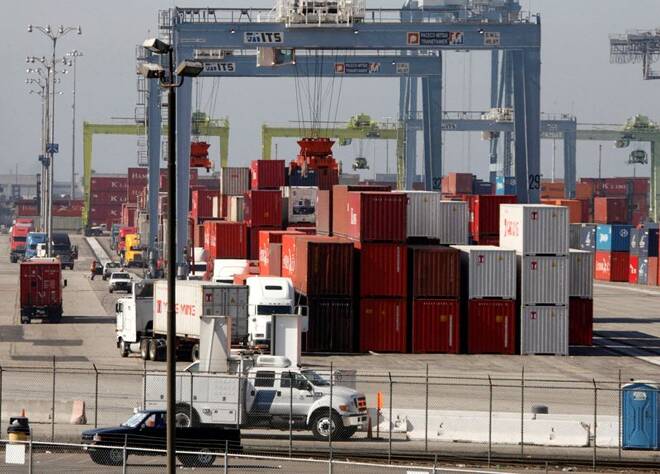Advertisement
Advertisement
U.S. West Coast port labor contract expires, raising stakes for talks
By:
By Lisa Baertlein LOS ANGELES (Reuters) - The contract covering more than 22,000 workers at 29 U.S. West Coast ports expires late on Friday, dialing up worries that labor disruption could roil the nation's battered supply chains, stoke inflation and threaten a weakening economy.
By Lisa Baertlein
LOS ANGELES (Reuters) -The union and employers negotiating a new labor contract for more than 22,000 U.S. West Coast port workers said high-stakes talks that are being closely watched by industry and the White House would continue after the agreement expired late on Friday.
The agreement covers 29 Pacific Coast ports stretching from California to Washington State that handle almost 40% of U.S. imports. Any work slowdowns or stoppages could roil the nation’s already battered supply chains, stoke inflation, and exacerbate pressure on a weakening economy that is sinking President Joe Biden’s approval ratings.
“While there will be no contract extension, cargo will keep moving, and normal operations will continue at the ports until an agreement can be reached,” the Pacific Maritime Association (PMA) employer group and the International Longshore and Warehouse Union (ILWU) said in a joint statement.
“Both sides understand the strategic importance of the ports to the local, regional and U.S. economies, and are mindful of the need to finalize a new coast-wide contract as soon as possible,” PMA and ILWU ahead of the contract expiration at 5 p.m. PDT Friday (0000 GMT Saturday).
When the contract expired, so did its “no strike” clause, said Peter Tirschwell, vice president of maritime, trade and supply chain at S&P Global Market Intelligence.
Hours before the expiration, more than 150 business groups implored Biden to push for a smooth and swift resolution.
Groups representing industries from agriculture and apparel to trucking and toys asked the president to work with PMA and ILWU to extend the contract, commit to ongoing good-faith negotiations, and avoid any activity that would cause further disruptions.
The labor faceoff has been on Biden’s radar for months. He took the unusual step of meeting with the ILWU and PMA in Los Angeles on June 10. His labor secretary makes weekly check-ins with both sides, which kicked off talks in May.
“We’ve never had a White House that is all over these negotiations the way they are now,” Tirschwell said.
The last West Coast port labor contract negotiation broke down in 2015 after nine months. Dockworkers stopped work for eight days, which gummed up trade flows and siphoned an estimated $8 billion from the Southern California economy alone. President Barack Obama dispatched his labor secretary to forge a deal.
Automating the movement of containers at the ports, resulting in fewer jobs, appears to be a key issue in the current talks. Neither side has identified the issue specifically, but the PMA and ILWU have released dueling studies on the impact of automation and traded barbs in the media.
In a statement on June 14, PMA and ILWU said they were not planning any work stoppages or lockouts that would worsen existing shipping logjams.
Still, wary shippers are not taking any chances. They are routing cargo away from the West Coast to avoid potential labor-related slowdowns, particularly at the nation’s busiest seaport complex at Los Angeles/Long Beach. That is driving up costs and contributing to backups at ports in New York/New Jersey, Savannah and Houston.
(Reporting by Lisa Baertlein in Los AngelesEditing by Marguerita Choy, Alistair Bell and Leslie Adler)
About the Author
Reuterscontributor
Reuters, the news and media division of Thomson Reuters, is the world’s largest international multimedia news provider reaching more than one billion people every day. Reuters provides trusted business, financial, national, and international news to professionals via Thomson Reuters desktops, the world's media organizations, and directly to consumers at Reuters.com and via Reuters TV. Learn more about Thomson Reuters products:
Latest news and analysis
Advertisement
